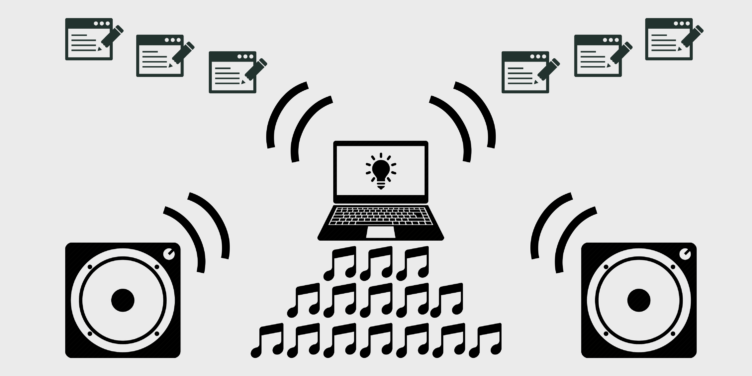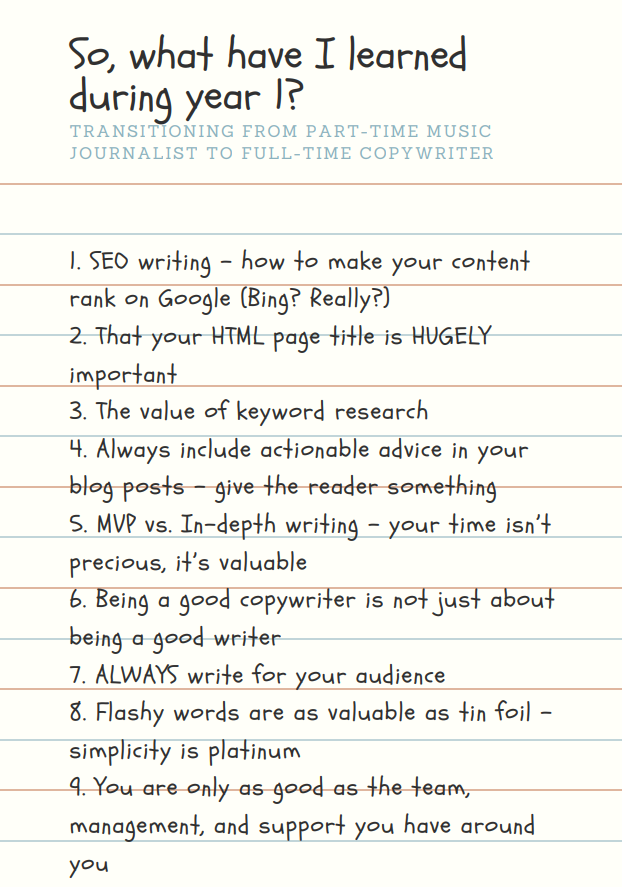
In September 2017 I started working at Seeker Digital. “So what?” I hear you say. Well, joining Seeker wasn’t just the beginning of a new job, it was the start of a career.
Below, I’ve given you a run through of the first year of my transition from part-time music journalist to full-time copywriter.
Recommended reading: What The Daily Mail Can Teach Us About Good Content
Barely enough education to inform
I’m not a writer by training. I didn’t study Creative Writing, English, Journalism, or any of the other traditional topics that would build a career path towards being a copywriter. I also have no copywriting qualifications.
My undergraduate studies were in History and Politics, and I completed an MA in Russian History for my postgraduate education. After this I spent time working in finance and produced financial reports, covering areas like pensions, insurance, and investments.
But during my years working in finance I spent my evenings writing for an online music magazine. It was here that I cut my writing teeth.
Music journalism & copywriting: we ain’t so different, you & I
Why music journalism? It’s simple. I love music and I love writing. So being a music journalist makes sense. But now you’re saying to yourself: “I don’t the logic in transitioning from music journalist to copywriter.” I’ll show you the logic.
Almost every writer picks up a pen or rests their fingers on a keyboard because they love to write. But do you know what? It’s not a lot of fun being the only person reading your work. And what’s the secret to getting your work published? Write for other people.
People choose music journalism because they think every piece they write will be about their favourite band. However, like all jobs, music journalism has clients. As a music journalist your clients are your readers, the industry agents you speak with, and the brands who pay for advertising.
In copywriting, you also have readers, industry agents, and brands to please. And in order to be successful you have to write for all of them. Once I appreciated this, the transition to copywriting didn’t just make sense — it was verging on logical.
To me-to you: transferable skills, in brief
Music journalism and copywriting don’t just share a purpose – writing for other people – there are a large number of skills that are directly and indirectly transferable:
- Interviews
- Reviews
- News pieces
- Original features
- Press releases
Of these different content types, the ones which are most relevant to the briefs I complete as a copywriter are: original features and press releases. Why? Read on and I’ll explain.
If you can scribe an original feature you can write a blog post
As a copywriter, I write a lot of blog posts. These cover root subjects like content marketing, the tech industry, and social media. These branch out into an infinite number of niche and sub topics. For example, let’s take social media:
I could be asked to write a beginner’s guide to Snapchat, I might be tasked with the explaining which platform is best for a new business, or I may be told to breakdown Twitter analytics. These are just for starters.
I might be well-versed in the root subject, I may also have experience of the sub topic – hell, I could have a deeper understanding still. However, more often than not, there will be plenty of knowledge gaps and it’s my job as a copywriter to fill them.
I fill this gaps with quick, accurate, and probing research. And instead of spending hours squirreling away to invent my own opinions, I develop a unique slant on someone else’s. Now, unless you’re writing about a passion subject, that’s exactly how you write an original feature as a music journalist.
Read a press release? Writing a brand page will be a breeze
Press representatives can be anathema to music journalists. The endless emails, the shitty bands they ask you to feature, and the pointless voicemails – seriously, if I didn’t give you the answer you wanted in the email I sent then why will you get it from speaking to me?
However, PRs also provide a valuable bridge between creative writing and copywriting. How? With their press releases.
At their heart, press releases are advertising copy. They’re a clipped marketing campaign dressed in artistic sentiment. Their job is to answer a problem you have (a gap of great music to cover) and sell you their solution: the artist.
This problem and solution approach is at the heart of the pure copywriting. Where do I use it the most?
- Website landing pages
- Ecommerce product pages
- Brand ‘about’ pages
And those are just three relevant examples from a list that covers almost anything you can be asked to cover as a copywriter.
Of course, there are more nuances to what I’ve said above. However, if you first understand the problems your audience have, then angle your client’s product as the solution, you’ll have fought most of the battle. The rest is simple: let your words win the war for you.
So, what have I learned during year 1?
I could spend thousands of paragraphs explaining what I’ve learnt in year 1 as a copywriter. But that’s not the point of being a copywriter. My job is to give my reader the answer they want in the least number of words. So, here you go:

Making the transition from part-time music journalist has been the best move I could have made. Putting the hard hours spent across many years into practice has been more rewarding than I could have imagined, and this is only the beginning – Don Draper, I’m coming for you…
